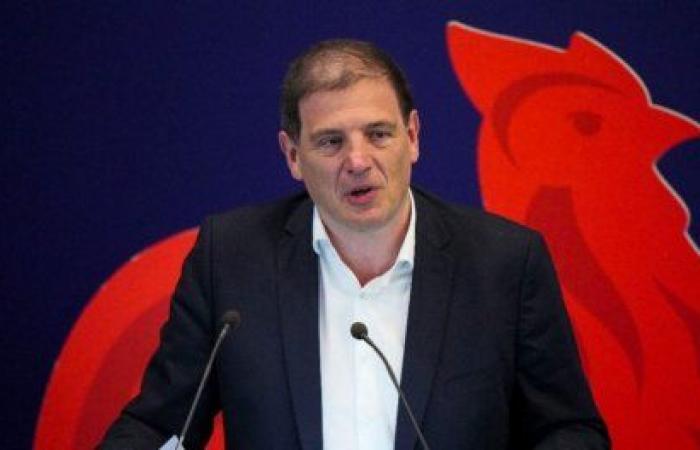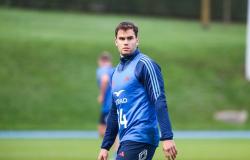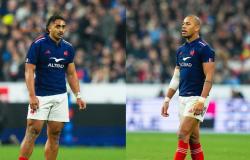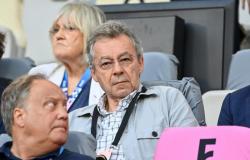Clément Pédron, Media365, published on Tuesday November 5, 2024 at 10:32 a.m.
Just re-elected as head of the French Rugby Federation, Florian Grill takes stock of recent sporting and extra-sporting events in recent months. The man on the ground wants to put rugby back on a healthy foundation and that starts with the development and improvement of the conditions for amateur and women's practice throughout the territory. Another significant and not neglected point: the French teams and the reinforced performance plan.
Florian Grill, who would be a successful mandate for you?
A successful mandate would mean that we have effectively succeeded in relaunching rugby from the grassroots and therefore redeploying rugby in villages and medium-sized towns. It would be to better cover certain territories which are gray areas for rugby. We talked about Brittany, there are the Pays de la Loire, Hauts-de-France, the Grand Est. There are territories to be won. It would mean that we have greatly renovated the facilities of the amateur clubs which, for some, are poor. May the Federation regain influence and weight at the international level. This is why we are pushing for the candidacy of Abdelatif Benazzi. And then, it would be that we had sporting performances with the VI Nations tournaments. I'm talking about men, women, under-20s, with my sights set on the World Cup in Australia in 2027 and other major competitions. We must have restored our finances, we must have better organized the Federation and this must not be done to the detriment of amateur rugby. You have to connect it all. You can't just have a big head and a small body that can't handle it. When you know that 50% of the players on our 14 French teams come from towns or villages with less than 15,000 inhabitants, we understand that relaunching rugby from the grassroots is also a performance issue.
Two weeks ago, you were re-elected at the head of the French Rugby Federation with 67.22% of the votes against 32.78% for your opponent Didier Codorniou. This electoral campaign took place in a sensitive context, how did you come out of it?
What was trying was rather the drama of the summer with Mehdi (Narjissi, who disappeared at sea on August 7 in South Africa where he was with the French team). I've been in the field every weekend for eight years so it's not the travel that poses a problem for me. Above all, I came away flushed by the difficulties we encountered this summer. Afterwards, I am transcended by the issue, what rugby represents in society and everything that can bring it very positive. I am very motivated, I have a fantastic team around me. I consider us on a mission. We must fight so that rugby develops, fight so that rugby can benefit more people, fight so that women's rugby takes off. We have set an ambitious target of 100,000 female licensees, I have no doubt about the relevance of leading this fight.
Did you expect such a sensitive context at the time of the elections with the events of the summer?
No, I didn't expect that at all. But I want to say, let's turn the page. We have four years to develop rugby, I don't want to comment and rehash it. Fifteen months ago when we were elected just before the World Cup, we calmed down rugby, we extended our hand. Today, rugby does not have enough volunteers to deprive itself of some of them. I extend my hand to all those of good will so that we can build rugby. Because we are only passing through, but rugby is above all that. I didn't expect it to be hard but it doesn't matter, it's in the past.
What do you think made the difference at the polls?
I think what made the difference is that we've been working on polishing a project for eight years, that we've been in the field every weekend for eight years. I have an ultra-competent and ultra-motivated team around me that the clubs knew. It's this expertise, this permanent presence on the ground and then a project which is successful because we've been working on it for eight years.
Did you want to stop everything?
Yes. Following Mehdi's disappearance, I asked myself the question of resigning. I thought, Jean-Marc Lhermet (vice-president) and Sylvain Deroeux (general secretary), the same. Our responsibility, our duty, was on the contrary to manage with dignity and transparency. We also react as a father, not simply as a president.
How do we manage to cope?
We tell ourselves that the difficulty is nothing compared to what the family is going through and that our responsibility is first and foremost focused on the family. Resigning was easy. On the contrary, we produced an investigation report which is hard for the staff, which is hard for the Federation and therefore for its president, and which is hard for the ministry too. But we kept the commitment to transparency, dignity and responsibility.
And concerning the cases, “Jaminet” (author of racist remarks, 34-week suspension) and “Auradou-Jegou” (indicted for violent rape, their request for dismissal has not yet been judged) during the tour in Argentina…
(He cuts) We worked. We have released a new framework for the French teams which is not a control plan, which is a reinforced performance plan. Everyone understands very well. It is supported by Fabien Galthié, by all the staff and the players who understood the issue that a healthy lifestyle was part of the performance of a high-level athlete. Things are set up. We said there would be a before and an after. There is a before and an after. And everyone is well aware now that the sanctions regime exists and that no hand will shake.
The French team is preparing to participate in its fall tour. This is the first gathering since the World Cup elimination against South Africa and the last extra-sporting events, what does this gathering inspire you?
I'm glad we're talking about rugby again. There are three matches that are going to be exciting with Japan, New Zealand and Argentina. We also have the return of Antoine Dupont as captain. He is the last to have successfully set foot on the pitch of the Stade de France with his title of Olympic rugby sevens champion. It wonderfully launched the Paris 2024 Olympic Games.
You were just talking about Antoine Dupont, what does this return inspire you?
First of all, I have immense respect for this player who does good for rugby. Afterwards, I will always put the team forward. This is what Antoine does. We have a gem with us who, from a human point of view, is extremely inspiring in his intelligence, his professionalism, his humility. I hope that Antoine, with the addition of the captain's cap that the staff asked him to wear, will be an inspiration for all the players.
Did you expect Antoine Dupont to do so well at 7?
In any case, we made the bet, but we weren't wrong. With Jean-Marc, we validated the conditions in which Antoine, in connection with Stade Toulousain, in connection with the staff of the French team, with Jérôme Daret (rugby sevens coach), was able to join us to participate at these Paris 2024 Olympic Games. Everyone did the right thing, including Antoine. It was a real success. Afterwards, let's not forget that there was a successful French 7s team before him. Afterwards, obviously, Antoine's contribution is undeniable with this first gold medal in Los Angeles for 19 years, this world champion medal in Madrid. And then, the Olympic title.
What are the objectives of this fall tour?
It is not the president's objectives that change anything. We want to find our audience again, we want to find the smile we knew during the Games. We want to rediscover the incredible atmosphere of fraternity, where the supporters mingle like during the World Cup at home. We want to rediscover these joys, to share them with the National Rugby League, with whom we work hand in hand. I think that French rugby is strong when the Federation and the League speak with one voice and that is really the case. We work together to develop rugby and give it the beautiful image it deserves.






